英语句子类型的转换
- 格式:doc
- 大小:62.00 KB
- 文档页数:8
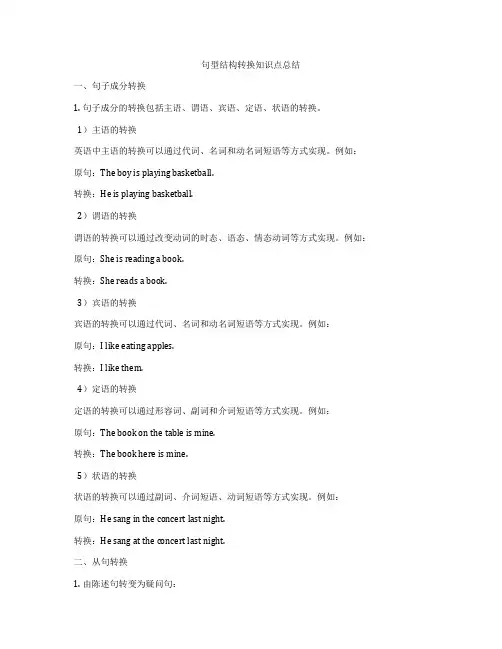
句型结构转换知识点总结一、句子成分转换1. 句子成分的转换包括主语、谓语、宾语、定语、状语的转换。
1)主语的转换英语中主语的转换可以通过代词、名词和动名词短语等方式实现。
例如:原句:The boy is playing basketball.转换:He is playing basketball.2)谓语的转换谓语的转换可以通过改变动词的时态、语态、情态动词等方式实现。
例如:原句:She is reading a book.转换:She reads a book.3)宾语的转换宾语的转换可以通过代词、名词和动名词短语等方式实现。
例如:原句:I like eating apples.转换:I like them.4)定语的转换定语的转换可以通过形容词、副词和介词短语等方式实现。
例如:原句:The book on the table is mine.转换:The book here is mine.5)状语的转换状语的转换可以通过副词、介词短语、动词短语等方式实现。
例如:原句:He sang in the concert last night.转换:He sang at the concert last night.二、从句转换1. 由陈述句转变为疑问句:将英语陈述句转变为一般疑问句,需要将句子中的助动词放在主语前面。
例如:原句:He is watching TV.转换:Is he watching TV?2. 由陈述句转变为否定句:将英语陈述句转变为否定句,需要在句子中加入否定副词或否定词。
例如:原句:She likes ice cream.转换:She doesn't like ice cream.3. 由陈述句转变为感叹句:将英语陈述句转变为感叹句,可以在句子中加入感叹词或强调某个词语。
例如:原句:The movie is amazing.转换:What an amazing movie!三、虚拟语气转换1. 虚拟条件句的转换:将英语虚拟条件句转换为实际条件句,需要将虚拟条件从“were”改为“was”,并且将主句中的动词时态和语气相应改变。
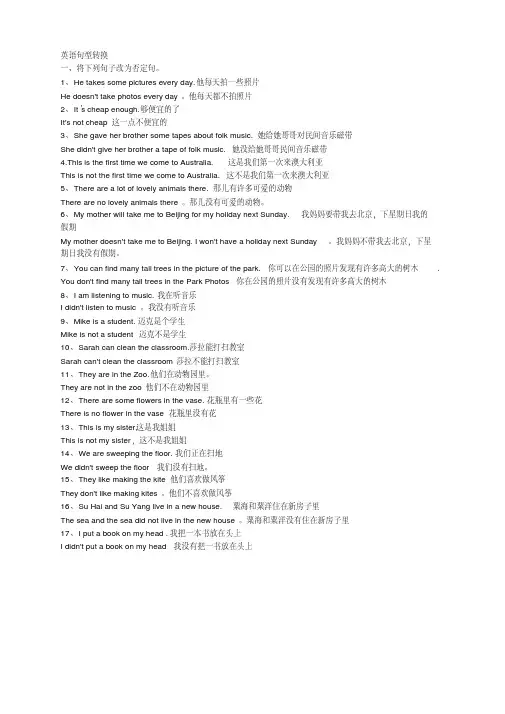
英语句型转换一、将下列句子改为否定句。
1、He takes some pictures every day.他每天拍一些照片He doesn't take photos every day。
他每天都不拍照片2、It’s cheap enough.够便宜的了It's not cheap这一点不便宜的3、She gave her brother some tapes about folk music.她给她哥哥对民间音乐磁带She didn't give her brother a tape of folk music.她没给她哥哥民间音乐磁带4.This is the first time we come to Australia. 这是我们第一次来澳大利亚This is not the first time we come to Australia.这不是我们第一次来澳大利亚5、There are a lot of lovely animals there.那儿有许多可爱的动物There are no lovely animals there。
那儿没有可爱的动物。
6、My mother will take me to Beijing for my holiday next Sunday.我妈妈要带我去北京,下星期日我的假期My mother doesn't take me to Beijing. I won't have a holiday next Sunday。
我妈妈不带我去北京,下星期日我没有假期。
7、You can find many tall trees in the picture of the park.你可以在公园的照片发现有许多高大的树木. You don't find many tall trees in the Park Photos你在公园的照片没有发现有许多高大的树木8、I am listening to music.我在听音乐I didn't listen to music。
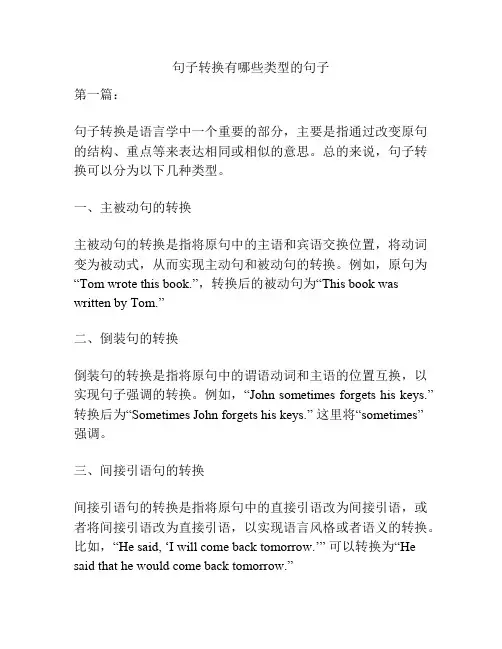
句子转换有哪些类型的句子第一篇:句子转换是语言学中一个重要的部分,主要是指通过改变原句的结构、重点等来表达相同或相似的意思。
总的来说,句子转换可以分为以下几种类型。
一、主被动句的转换主被动句的转换是指将原句中的主语和宾语交换位置,将动词变为被动式,从而实现主动句和被动句的转换。
例如,原句为“Tom wrote this book.”,转换后的被动句为“This book was written by Tom.”二、倒装句的转换倒装句的转换是指将原句中的谓语动词和主语的位置互换,以实现句子强调的转换。
例如,“John sometimes forgets his keys.” 转换后为“Sometimes John forgets his keys.” 这里将“sometimes”强调。
三、间接引语句的转换间接引语句的转换是指将原句中的直接引语改为间接引语,或者将间接引语改为直接引语,以实现语言风格或者语义的转换。
比如,“He said, ‘I will come back tomorrow.’” 可以转换为“He said that he would come back tomorrow.”综上所述,句子转换在语言学中起着非常重要的作用。
我们需要了解不同类型的转换方式,以实现词汇和语法的准确表述。
第二篇:在英语教学中,句子转换是一个非常常见的语法要点。
句子转换主要是指通过对句子的结构、形式、语言风格等进行变化,使其表达的意思不变或者表达相似的意思。
一、陈述句和疑问句的转换陈述句和疑问句的转换是指将原句中的陈述句变为疑问句,或者将疑问句变为陈述句。
例如,“I am a student.” 变为疑问句为“Are you a student?”,而“Where is your home?” 变为陈述句为“My home is here.”二、比较句和原级句、最高级句的转换比较句和原级句、最高级句的转换是指把比较句转换成原级句或者最高级句,或者将原级句或最高级句转换成比较句。
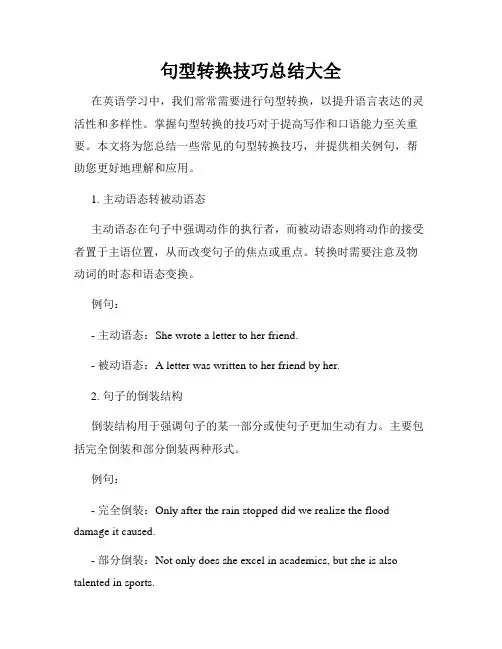
句型转换技巧总结大全在英语学习中,我们常常需要进行句型转换,以提升语言表达的灵活性和多样性。
掌握句型转换的技巧对于提高写作和口语能力至关重要。
本文将为您总结一些常见的句型转换技巧,并提供相关例句,帮助您更好地理解和应用。
1. 主动语态转被动语态主动语态在句子中强调动作的执行者,而被动语态则将动作的接受者置于主语位置,从而改变句子的焦点或重点。
转换时需要注意及物动词的时态和语态变换。
例句:- 主动语态:She wrote a letter to her friend.- 被动语态:A letter was written to her friend by her.2. 句子的倒装结构倒装结构用于强调句子的某一部分或使句子更加生动有力。
主要包括完全倒装和部分倒装两种形式。
例句:- 完全倒装:Only after the rain stopped did we realize the flood damage it caused.- 部分倒装:Not only does she excel in academics, but she is also talented in sports.3. 直接引语转间接引语直接引语是直接引述他人的话语,而间接引语是将他人的话语间接转述。
转换时需要注意时态、人称和句子结构的变化。
例句:- 直接引语:He said, "I will come to the party."- 间接引语:He said that he would come to the party.4. 变换感叹句为陈述句感叹句常用于表达强烈的情感或强调某一事实。
转换时需要将感叹句的结构变为陈述句,并去掉感叹号。
例句:- 感叹句:What a beautiful sunset it is!- 陈述句:The sunset is so beautiful.5. 句子的并列与复合结构转换并列句由两个或多个主语、动词或句子并列构成,复合句由主句和一个或多个从句构成。
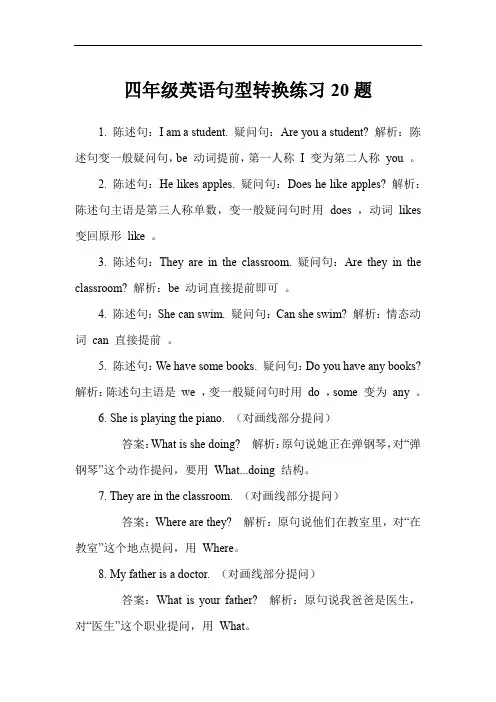
四年级英语句型转换练习20题1. 陈述句:I am a student. 疑问句:Are you a student? 解析:陈述句变一般疑问句,be 动词提前,第一人称I 变为第二人称you 。
2. 陈述句:He likes apples. 疑问句:Does he like apples? 解析:陈述句主语是第三人称单数,变一般疑问句时用does ,动词likes 变回原形like 。
3. 陈述句:They are in the classroom. 疑问句:Are they in the classroom? 解析:be 动词直接提前即可。
4. 陈述句:She can swim. 疑问句:Can she swim? 解析:情态动词can 直接提前。
5. 陈述句:We have some books. 疑问句:Do you have any books? 解析:陈述句主语是we ,变一般疑问句时用do ,some 变为any 。
6. She is playing the piano. (对画线部分提问)答案:What is she doing? 解析:原句说她正在弹钢琴,对“弹钢琴”这个动作提问,要用What...doing 结构。
7. They are in the classroom. (对画线部分提问)答案:Where are they? 解析:原句说他们在教室里,对“在教室”这个地点提问,用Where。
8. My father is a doctor. (对画线部分提问)答案:What is your father? 解析:原句说我爸爸是医生,对“医生”这个职业提问,用What。
9. I have a new book. (对画线部分提问)答案:What do you have? 解析:原句说我有一本新书,对“一本新书”提问,用What...have 结构。
10. He likes apples. (对画线部分提问)答案:What does he like? 解析:原句说他喜欢苹果,对“苹果”提问,用What...like 结构。
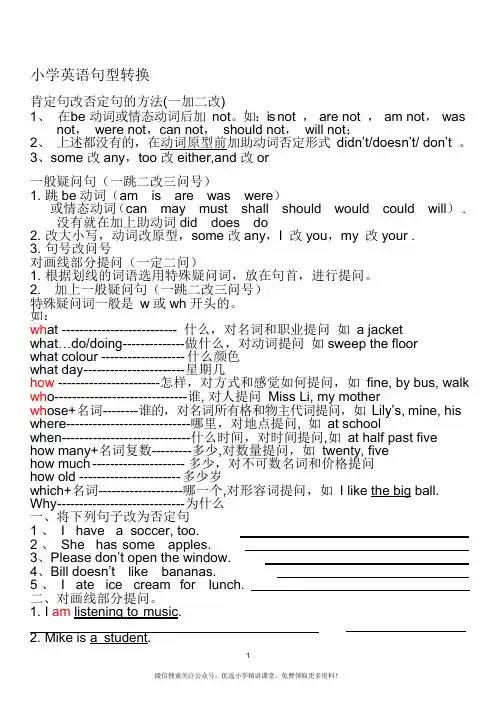
小学英语句型转换肯定句改否定句的方法(一加二改)1、在be 动词或情态动词后加not。
如:is not ,are not ,am not,wasnot,were not,can not,should not,will not;2、上述都没有的,在动词原型前加助动词否定形式didn’t/doesn’t/ don’t。
3、some 改any,too 改either,and 改or一般疑问句(一跳二改三问号)1. 跳be 动词(am is are was were)或情态动词(can may must shall should would could will).没有就在加上助动词did does do2. 改大小写,动词改原型,some 改any,I 改you,my 改your .3. 句号改问号对画线部分提问(一定二问)1. 根据划线的词语选用特殊疑问词,放在句首,进行提问。
2. 加上一般疑问句(一跳二改三问号)特殊疑问词一般是w 或wh 开头的。
如:wh at -------------------------- 什么,对名词和职业提问如a jacketwhat…do/doing--------------做什么,对动词提问如sweep the floorwhat colour ------------------- 什么颜色what day ----------------------- 星期几how -----------------------怎样,对方式和感觉如何提问,如fine, by bus, walk wh o------------------------------谁, 对人提问Miss Li, my motherwh ose+名词--------谁的,对名词所有格和物主代词提问,如Lily’s, mine, his where----------------------------哪里,对地点提问, 如at schoolwhen-----------------------------什么时间,对时间提问,如at half past fivehow many+名词复数---------多少,对数量提问,如twenty, fivehow much --------------------- 多少,对不可数名词和价格提问how old ----------------------- 多少岁which+名词-------------------哪一个,对形容词提问,如I like the big ball. Why ----------------------------- 为什么一、将下列句子改为否定句1 、I have a soccer, too.2 、She has some apples.3、Please don’t open the window.4、Bill doesn’t like bananas.5 、I ate ice cream for lunch.二、对画线部分提问。
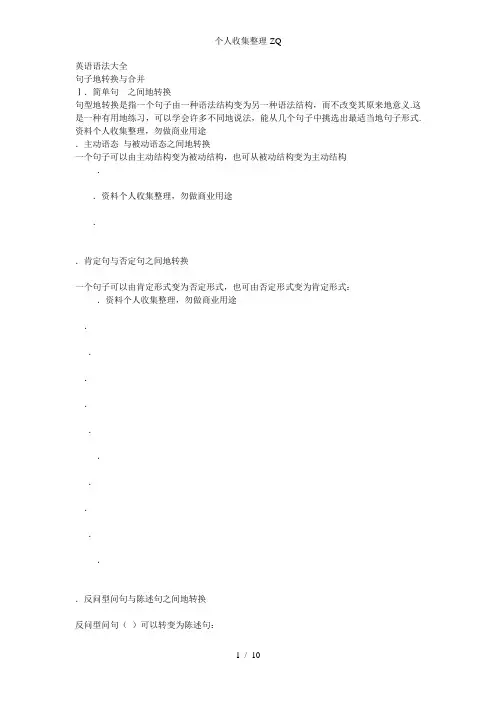
英语语法大全句子地转换与合并Ⅰ.简单句之间地转换句型地转换是指一个句子由一种语法结构变为另一种语法结构,而不改变其原来地意义.这是一种有用地练习,可以学会许多不同地说法,能从几个句子中挑选出最适当地句子形式.资料个人收集整理,勿做商业用途.主动语态与被动语态之间地转换一个句子可以由主动结构变为被动结构,也可从被动结构变为主动结构..资料个人收集整理,勿做商业用途..肯定句与否定句之间地转换一个句子可以由肯定形式变为否定形式,也可由否定形式变为肯定形式:.资料个人收集整理,勿做商业用途...........反问型问句与陈述句之间地转换反问型问句()可以转变为陈述句:.?.?.?.?..不同词类之间地转换几乎任何词类都可以转换为另一词类.可以是:.动词与名词间地转换:..资料个人收集整理,勿做商业用途...动词与形容词之间地转换:.....动词与副词间地转换:....名词与形容词间地转换:.,.资料个人收集整理,勿做商业用途...名词与副词间地转换:.,...形容词与副词间地转换:,...介词与连词间地转换:....Ⅱ.简单句与复合句之间地转换一个分词、动名词、不定式或介词短语可以转换为复合句,反过来也如此:—,.,.,...,.,.,.,..Ⅲ.简单句与复杂句之间地转换一个词或是短语可以转变为名词从句、定语从句或状语从句,反过来也如此:.名词从句......资料个人收集整理,勿做商业用途....定语从句-...-.-....状语从句.资料个人收集整理,勿做商业用途,..资料个人收集整理,勿做商业用途.,.' .,...大部分短语不仅可以变为并列地分句,也可以变为状语从句.Ⅳ.复杂句与复合句之间地转换...,.,.资料个人收集整理,勿做商业用途.,.,.,.Ⅴ.直接引语和间接引语之间地转换说话人讲地话可以用两种方式来引用.如果引用他地原话,就称作直接引语.因此,“ .”为直接引语.如果按引用人地观点来引用,则称为间接引语.因此.为间接引语.这样地动词称为引话动词,它前面地主语,例如,可称为第一主语.引语中地主语,如及,称为第二主语.引语中地谓语动词称为第二动词.当直接引语转换为间接引语,或间接引语转换为直接引语时,有几个问题需要注意..大写与标点直接引语放在引号之内,第一个字母要大写,引号前加逗号(间或用冒号),引语末加句号、问号或感叹号,但在间接引语中却不加这些.间接引语必须由,()或疑问词(,,等)开头,末尾要加句号.此外,在直接引语中问句可能有倒装语序(助动词放在主语前面),但在间接引语中,问句则需变为自然语序:,“ .”:“ ?”.引话动词与第二动词引话动词可以是,,,,,;,,;,;,;,,,,;,;,,,,;,;,,;,,,;,,等等.若引话动词是现在时或将来时,则当引语由直接变为间接时,第二动词照旧不变.但若引话动词是过去时,则间接引语中地第二动词,就要由现在时变为过去时,由过去时变为过去完成时等.(),“ (,).”()(,).,“ (,).(,)..引话动词与连词.如果间接引语为陈述句,它前面通常都有:,,,,….如果它是问句,它前面通常有:()(),(),(),,;或()+(即疑问词,如,,,,),()+,….如果它是感叹句,它前面通常有:,,….如果间接引语为祈使句,它前面通常有:,,,,,…且里面包含助动词.此外间接引语还可以转换为不定式短语,这时引话动词需要改为宾补动词:.,“ ”.,“ .”.,“ ?”,“ ?”,“ ?”..,“ !”,“!.”,“ !.”资料个人收集整理,勿做商业用途,“!.”.,“ .”,“ .”.代词此外还要注意,把直接引语变为间接引语时,代词需作改变.如果在直接引语中代词为第一人称,在变为间接引语时,将变为与第一主语一致地代词.,“ .”.,“ .”资料个人收集整理,勿做商业用途,“ .”,“ .”,“ .”“ .”(中包括)资料个人收集整理,勿做商业用途如果在直接引语中,代词为第二人称,在间接引语中它将变成与引话动词地宾语一致地人称:,“ .”,“ .”,“ .”,“ .”,“ .”也可看作是宾语:(),“ .”,“ .”引话动词地宾语有时可以省略,但它在间接引语中可能需要说出来:.,“ .”… .如果在直接引语中代词为第三人称,在间接引语中,它可以保持不变:,“ .”,“ .”,“ .”,“ .”(这两个代表两个不同地人)还需指出,上述代词,在直接或间接引语中,可以为任何“格”,而不仅仅是主格:,“ .”“ !”.时间副词(短语)间接引语中地时间副词(短语)可能和直接引语中地时间副词(短语)不同,这是因为原来说话人提到地时间可能与现在引话人提到地时间不同:,“ .”,“ .”().,“ .”().,“ .”().,“ !”()..第一主语及引话动词地位置在新闻报导中第一主语有时放在引话动词地后面:,“…”.,“…”,“…”第一主语及引话动词,除了放在直接引语前面外,还可放在其他位置:,“!.”“!” ,“ .”(但不说)“!,” .(但不说)“!.”(如果大家都清楚这话是谁说地,第一主语及引话动词也可不必说出.)在第一主语及引话动词放在其他位置时,要注意标点符号:,“,;..”“,” ,“ ;..”“,,” ;“ ,.”如果引话动词有较长地修饰语,最好把它放在主语及引话动词前面,如果主语及引话动词在直接引语后面,长修饰语最好放在引话动词后面:,“' .”“' ,” .如果主语和引话动词放在直接引语地中间或后面,作主语地名词可以放在引话动词地后面或前面(若主语是人称代词,只能放在动词后面):“ ,” (,).(很少说)“ !” (,).(很少说)Ⅵ.简单句地合并两个或更多简单句可以合并成一个比较复杂地句子,这种练习对学习写作地人很有好处.两个或更多简单句可借助并列连词合并成一个复合句:.......资料个人收集整理,勿做商业用途两个或更多简单句,可以加上从属连词,把一个或更多句子变为名词从句、定语从句或状语从句,这样来合并成为一个复杂句..变成名词从句:....资料个人收集整理,勿做商业用途?.?..变成定语从句:?....' ..变成状语从句:.,.........两个或更多简单句,也可以把其中一个或更多简单句变成一个短语,甚至一个词,来合并成一个较为复杂地简单句:...(用同位语代替一个句子)..(用介词短语代替句子)..(用“介词动名词”结构代替句子)资料个人收集整理,勿做商业用途..(用不定式代替句子)..(用分词代替句子)资料个人收集整理,勿做商业用途。
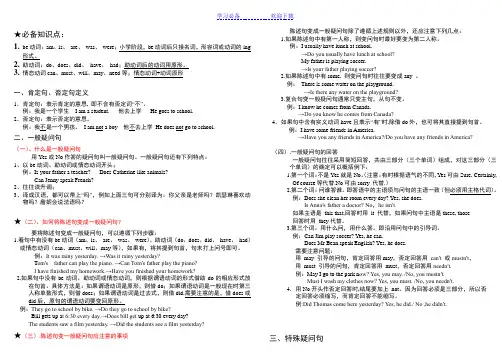
★必备知识点:1.be动词:am、is、are、was、were;小学阶段,be动词后只接名词,形容词或动词的ing形式。
2.助动词:do、does、did、have、had;助动词后的动词用原形。
3.情态动词can、must、will、may、need等;情态动词+动词原形一、肯定句、否定句定义1.肯定句:表示肯定的意思, 即不含有否定词“不”。
例:我是一个学生I am a student. 他去上学He goes to school.2.否定句:表示否定的意思。
例:我不是一个男孩。
I am not a boy 他不去上学He does not go to school.二、一般疑问句(一)、什么是一般疑问句用Yes或No作答的疑问句叫一般疑问句。
一般疑问句还有下列特点:1、以be动词、助动词或情态动词开头;例:Is your father a teacher? Does Catherine like animals?Can Jenny speak French?2、往往读升调;3、译成汉语,都可以带上“吗”,例如上面三句可分别译为:你父亲是老师吗?凯瑟琳喜欢动物吗?詹妮会说法语吗?★(二)、如何将陈述句变成一般疑问句?要将陈述句变成一般疑问句,可以遵循下列步骤:1.看句中有没有be动词(am、is、are、was、were)、助动词(do、does、did、have、had)或情态动词(can、must、will、may等),如果有,将其提到句首,句末打上问号即可。
例:It was rainy yesterday. →Was it rainy yesterday?T om's father can play the piano. →Can Tom's father play the piano?I have finished my homework.→Have you finished your homework?2.如果句中没有be动词、助动词或情态动词,则根据谓语动词的形式借助do的相应形式放在句首。
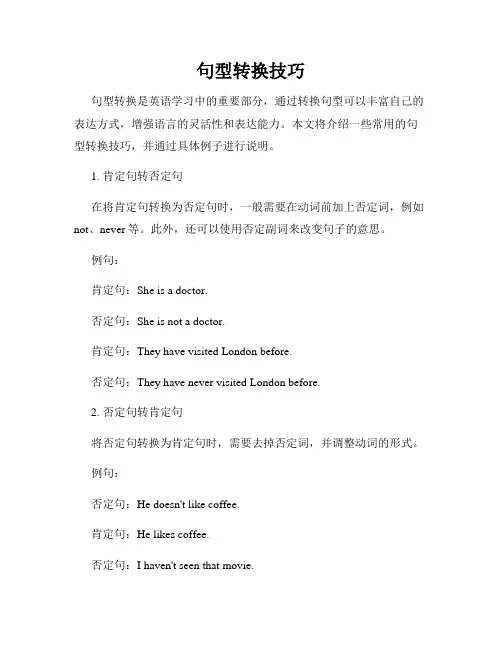
句型转换技巧句型转换是英语学习中的重要部分,通过转换句型可以丰富自己的表达方式,增强语言的灵活性和表达能力。
本文将介绍一些常用的句型转换技巧,并通过具体例子进行说明。
1. 肯定句转否定句在将肯定句转换为否定句时,一般需要在动词前加上否定词,例如not、never等。
此外,还可以使用否定副词来改变句子的意思。
例句:肯定句:She is a doctor.否定句:She is not a doctor.肯定句:They have visited London before.否定句:They have never visited London before.2. 否定句转肯定句将否定句转换为肯定句时,需要去掉否定词,并调整动词的形式。
例句:否定句:He doesn't like coffee.肯定句:He likes coffee.否定句:I haven't seen that movie.肯定句:I have seen that movie.3. 疑问句转陈述句将疑问句转换为陈述句时,需要改变句子的语序,并去掉疑问词。
这种转换常用于回答问题或陈述事实。
例句:疑问句:Is she your sister?陈述句:She is your sister.疑问句:Do you like pizza?陈述句:You like pizza.4. 陈述句转疑问句将陈述句转换为疑问句时,需要在句首添加助动词或情态动词,并调整语序。
这种转换常用于提问或确认信息。
例句:陈述句:He plays tennis.疑问句:Does he play tennis?陈述句:She is going to the party.疑问句:Is she going to the party?5. 一般句转倒装句在某些情况下,为了强调某个部分或使句子更加流畅,可以将一般句转换为倒装句。
在倒装句中,助动词或情态动词位于主语之前。
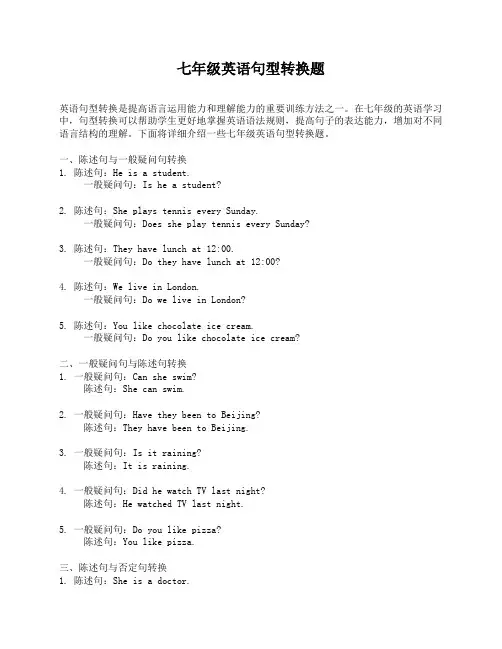
七年级英语句型转换题英语句型转换是提高语言运用能力和理解能力的重要训练方法之一。
在七年级的英语学习中,句型转换可以帮助学生更好地掌握英语语法规则,提高句子的表达能力,增加对不同语言结构的理解。
下面将详细介绍一些七年级英语句型转换题。
一、陈述句与一般疑问句转换1. 陈述句:He is a student.一般疑问句:Is he a student?2. 陈述句:She plays tennis every Sunday.一般疑问句:Does she play tennis every Sunday?3. 陈述句:They have lunch at 12:00.一般疑问句:Do they have lunch at 12:00?4. 陈述句:We live in London.一般疑问句:Do we live in London?5. 陈述句:You like chocolate ice cream.一般疑问句:Do you like chocolate ice cream?二、一般疑问句与陈述句转换1. 一般疑问句:Can she swim?陈述句:She can swim.2. 一般疑问句:Have they been to Beijing?陈述句:They have been to Beijing.3. 一般疑问句:Is it raining?陈述句:It is raining.4. 一般疑问句:Did he watch TV last night?陈述句:He watched TV last night.5. 一般疑问句:Do you like pizza?陈述句:You like pizza.三、陈述句与否定句转换1. 陈述句:She is a doctor.否定句:She is not a doctor.2. 陈述句:I can swim.否定句:I cannot swim.3. 陈述句:We visit our grandparents every summer.否定句:We do not visit our grandparents every summer.4. 陈述句:He likes playing basketball.否定句:He does not like playing basketball.5. 陈述句:They have finished their homework.否定句:They have not finished their homework.四、特殊疑问句与陈述句转换1. 特殊疑问句:What is your name?陈述句:My name is Tom.2. 特殊疑问句:When did you wake up this morning?陈述句:I woke up this morning.3. 特殊疑问句:Where is the nearest supermarket?陈述句:The nearest supermarket is here.4. 特殊疑问句:How many students are there in your class?陈述句:There are 30 students in my class.5. 特殊疑问句:Why did you go to the park yesterday?陈述句:I went to the park yesterday for a picnic.通过以上的例题,可以看出七年级英语句型转换题主要包括陈述句与一般疑问句的转换、一般疑问句与陈述句的转换、陈述句与否定句的转换以及特殊疑问句与陈述句的转换等。
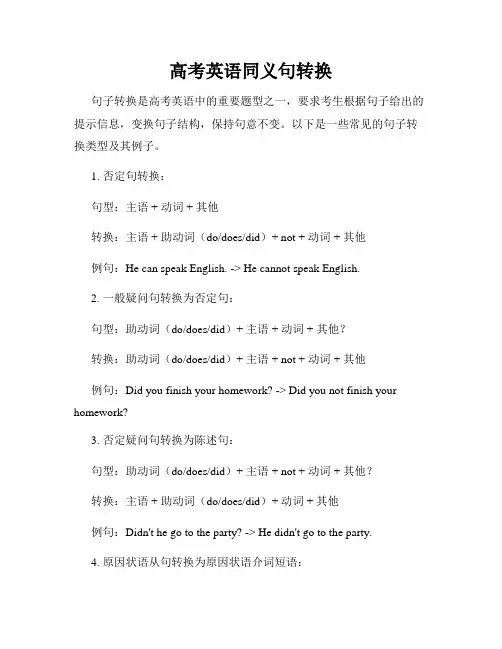
高考英语同义句转换句子转换是高考英语中的重要题型之一,要求考生根据句子给出的提示信息,变换句子结构,保持句意不变。
以下是一些常见的句子转换类型及其例子。
1. 否定句转换:句型:主语 + 动词 + 其他转换:主语 + 助动词(do/does/did)+ not + 动词 + 其他例句:He can speak English. -> He cannot speak English.2. 一般疑问句转换为否定句:句型:助动词(do/does/did)+ 主语 + 动词 + 其他?转换:助动词(do/does/did)+ 主语 + not + 动词 + 其他例句:Did you finish your homework? -> Did you not finish your homework?3. 否定疑问句转换为陈述句:句型:助动词(do/does/did)+ 主语 + not + 动词 + 其他?转换:主语 + 助动词(do/does/did)+ 动词 + 其他例句:Didn't he go to the party? -> He didn't go to the party.4. 原因状语从句转换为原因状语介词短语:句型:因果关系连词 + 主语 + 谓语 + 其他转换:介词 + 名词 + 主语 + 谓语 + 其他例句:As she was tired, she went to bed early. -> Because of tiredness, she went to bed early.5. 直接引语转换为间接引语:句型:直接引语转换:间接引语例句:She said, "I am going to the park." -> She said that she was going to the park.6. 感叹句转换为陈述句:句型:How + 形容词/副词 + 主语 + 谓语转换:主语 + 谓语例句:How beautiful the flowers are! -> The flowers are beautiful.以上是一些常见的高考英语同义句转换类型及其例子。
四年级英语句型转换练习30题1. He is a student. (改为一般疑问句)答案:Is he a student? 解析:陈述句变一般疑问句,将be 动词is 提到句首,句末用问号。
2. They are in the classroom. (改为一般疑问句)答案:Are they in the classroom? 解析:同样将be 动词are 提到句首。
3. She has a pen. (改为一般疑问句)答案:Does she have a pen? 解析:此句has 是实义动词“有”,变为一般疑问句时,需借助助动词does,has 变为have。
4. I like apples. (改为一般疑问句)答案:Do you like apples? 解析:句中like 是实义动词,借助助动词do,I 变为you。
5. We play football on Sundays. (改为一般疑问句)答案:Do you play football on Sundays? 解析:play 是实义动词,借助助动词do,we 变为you。
6. She is a teacher. (对划线部分提问)答案:What is she? 解析:划线部分是“a teacher”,表示职业,所以用“What is she?”来提问。
7. I have a pen. (对划线部分提问)答案:What do you have? 解析:划线部分是“a pen”,是物品,用“What do you have?”询问。
8. They are in the classroom. (对划线部分提问)答案:Where are they? 解析:划线部分“in the classroom”是地点,用“Where are they?”提问。
9. He likes apples. (对划线部分提问)答案:What does he like? 解析:划线部分“apples”是物品,用“What does he like?”来问。
句子转化的形式有哪几种方法文章1:句子转化形式的几种方法句子转化形式是英语语法的基本内容之一。
下面分别从几种方法进行分析。
方法一:主动语态和被动语态的转换主动语态和被动语态是英语语法中相对基础的内容。
语态的转换通常从一个句子到另一个句子,需要调整主语和谓语动词的形式。
转化原则为:主语和宾语互换,谓语动词形式变动。
如:This cup is made of glass.Glass makes this cup.句子1是被动语态。
句子2是主动句型。
在句子2中,主语变为“glass”,谓语动词变为“makes”。
同时,“cup”变为“this cup”作为句子的宾语。
方法二:关系从句的转换关系从句是描述一个名词或代词与其他句子部分之间关系的句子。
通过将关系从句变成简单的句子,可以将信息更清晰地传递给读者。
如:The book which is on the table was written by J.K. Rowling.J.K. Rowling wrote the book on the table.在句子1中,“which is on the table”是一个关系从句。
在句子2中,“which is on the table”被孤立出来作为定语从句,而且谓语动词变成了简单的过去式。
方法三:祈使句和倒装句的转换祈使句是表达请求、命令或建议的句型。
它的基本句式是省略了主语的基本动词,且动词原形在句子首部。
倒装句句子中,谓语动词在主语之前。
如:Do not talk in the library.Talking in the library is not allowed.句子1是祈使句,句子2是同义句型。
句子2中第一部分“Talking in the library”是句子主语,谓语动词是“is not allowed”。
句子2中也涉及了被动语态。
总结:句子转换形式在英语语法中的应用广泛。
它可以帮助读者更好地理解句子的含义。
精品---六年级英语句型转换一、陈述句变一般疑问句.1.含有系动词(am,is,are) 或情态动词(can) 的句子变一般疑问句,首先将系动词或情态动词提到句首,然后改变大小写及标点符号。
(一、二人称要互换,即原句中的第一人称要变为第二人称,第二人称要变为第一人称)eg.(1)He is a policeman. →Is he a policeman?(2)I can do the dishes. →Can you do the dishes?2.不含系动词或情态动词的句子变一般疑问句,首先在句首加助动词Do,然后改变大小写及标点符号。
(一、二人称要互换)当句子的主语是第三人称单数时,首先在句首加助动词Does,然后将句子中的动词变为原型,最后改变大小写及标点符号。
eg. (1)I do my homework everyday. →Do you do your homework everyday?(2)She has long hair. →Does she have long hair?二、肯定句变否定句.1.含有系动词或情态动词的句子变否定句,直接在系动词或情态动词后加not。
eg. (1)There are some books on the desk. →There are not some books on the desk.(2)We can help her. →We can not help her.2.不含系动词或情态动词的句子变否定句,直接在句子的动词前加do not (don’t)。
当句子的主语是第三人称单数时,首先在句子的动词前加does not(doesn’t) 然后将句子中的动词变为原型。
eg. (1)I have an apple. →I don’t have an apple.(2)She has a sister. →She doesn’t have a sister.三、对划线部分提问的三个步骤。
英语句式转换方法英语句式转换方法一、一般疑问句1.如果句中有BE动词(am, is ,are , was,were)只需将be动词提前,some 变成any ,my 改成your口诀:一提(be动词提至句首)二改(大小写,some 变成any ,my 改成your),三问号。
注:句中有情态动词(can, may 等)方法相同。
例如:There is some milk in the bottle .Is there any milk in thebottle ?They were in the study just now . Were they in the study just now?I’d like some pies for my friends . Would you like some(不变any) pies for your friends ?2.如果句中没有be 动词,就看句中的实义动词。
(1 )动词时原型,口诀:一加(Do)二改三问号。
例如:I go to school at 7:00 in the morning. Do you go to school…?( 2 ) 动词加s或者es: 口诀:一加(Does)二改,三还原(将原句动词后的s或者es去掉)例如:His sister watches TV on Saturdays. Does his sister watch TV…?(3)动词为过去式:口诀:一加(Did)二改,三还原(将原句动词的过去式还原,去ed等)例如:He watched TV last night. Did he watch TV last night?二、否定句1.如果句中有BE动词(am, is ,are , was,were)只需在be动词后加not.some 变成any2. 如果句中没有be 动词,就看句中的实义动词。
(1 )动词时原型:动词前加don’t( 2 ) 动词加s或者es:动词前加doesn’t ,后还原加s或者es的动词。
--初中英语句型转换一、 肯定句改的方法——一步法1. 有 be动词(is are am were was)/情态动词(can,could, will, would, shall, should,must,may)的。
在 be 动词/情态动词后后加not。
2. 无be 动词/情态动词,一般现在时在动词前加 don’t 第三人称单数前 doesn't/一般过去式 didn’t。
3 加 doesn't/ did n’t 的句子注意,句子动词要变成原型。
二、 肯定句改一般疑问句的方法——三步法1. 有 be 动词/情态动词:be 动词/情态动词提到句首,其余照抄,(some 改成any,第一人称变为第二人称my改成 your , I 改成 you,we 改成 you,our 改成 your )句末用问号。
2. 无be动词/情态动词,在句首加 Do/Does/Did,其余照抄,(some 改成any,第一人称变为第二人称my 改成your , I 改成you,we 改成 you,our 改成 your )句末用问号。
3. 加 Does、did 的句子注意,句子动词要变成原型。
例如 陈述句: They are in the park.He can play the guitar.He likesthe dogs.否定句 They are not in the park. He can not play the guitar.Hedoesn't like the dogs一般疑问句: Are they in the park?Can he play the guitar?D o eshe like the dogs?把下列句子变成一般疑问句和 否定句1. I am listening to music. _______________________________________ ﻩ ﻩ2 Tom likes listening to music________________________________________3. Sarah can clean the classroom. _ ____ _ __ _ ______ _ _ _ _ _ _ _______ _ __ _ _ _ ﻩ______4. I put a book on my head. ﻩ______ _ _ _ _ _ _ ____________ _ ___ _ ______ _ ____5. There were some flowers in the vase. ___________________________________ﻩ_____ 6. We play basketball on Sundays. ______ 7 I go to see my parents once a month.___________________________ﻩ _______________________________----__8. She needs some masks._________________________________ﻩﻩﻩﻩﻩ9. They like making the puppet.ﻩﻩ______________________10.SuHai and Su Yang lived in a new house.________________________ﻩ____________________特殊疑问词的用法who whom what whichwhosewha t color What t i me when wherewhy意思 谁 谁什么 哪一个谁的什么颜色 几点 什么时候 什么地方为什么用法 问人的身份,姓 名等 问人的身份,姓 名等(问宾语) 问人的职业或 事物是什么 问一定范围内 特指的人或物问所属关系问颜色(表语) 问点时间问时间问地点(状语)问原因例句He is LiLieWho is he ?H e is m y b r o ther.Who ishe ?I can ask him the question.Whom can you ask the question?He is a worker.What is he?He has a book. What doeshe have ?The big box is mine. Whichbox is yours?The girl at the door is Ann.Which girl is Ann?This is her book. Whose book is this ?This book is hers. Whose is thisbook?My skirt is red. What color isyour skirt?We play games at five in the afternoon ?What time do you play games?W e pl a y gam e s i n the afternoon ?When do you play games?We play games at home on Sunday ?Where do you play games onSunday?He isn't at school today because he is ill.Why isn't he at school today ?--how怎样--问健康状况、 He is fine/strong.How is h做事的方式等 e ?I go home by bike. How do yougo home?how old 多大几岁 问年龄He is ten.How old is he ?how ma 多少跟复数名词,There are thirty boys in myny问数量class.How many boys are there in yourclass?h ow 多少跟不可数名词 There is some milk in the bottle.much问数量或价钱 How much milk is there in the bottle?h o w fa 多远问路程It's f ive ki lometers aw ay frrom here?How far is it from here?how soo 多久问 in+一段时间 He can finish it in half an hounr.How soon can he finish it ?h o w l 多久问一段时间,He has lived here for aong问物体的长短 year.How long has he lived here?The desk is one meters long.How long is the desk ?h o w 多久问频率I go to see my parents once aoften(一次)month.How often do you go to see your parents?How 的疑问句辨析一、how many 和how much 的区别how many 用来询问可数名词的数量,它的句式是:How many+复数名词+一般疑问句+?how much 用来询问不可数名词的数量,也可询问价格。
三大类句型转换(最新版)目录一、引言二、三大类句型转换的概念和分类1.疑问句转换为陈述句2.否定句转换为肯定句3.肯定句转换为否定句三、疑问句转换为陈述句的方法和示例四、否定句转换为肯定句的方法和示例五、肯定句转换为否定句的方法和示例六、结论正文一、引言在英语学习中,句型转换是一项重要的基本功。
掌握句型转换技巧,不仅能帮助我们更好地理解和运用英语语法,还能提高我们的语言表达能力。
本文将介绍三大类句型转换:疑问句转换为陈述句、否定句转换为肯定句、肯定句转换为否定句。
二、三大类句型转换的概念和分类1.疑问句转换为陈述句疑问句转换为陈述句,主要是将疑问句中的助动词(如:is, are, do, did, have, has, will, can 等)去掉,或者将助动词变为相应的动词形式,同时保持句子的语法结构不变。
例如:- 疑问句:Do you like apples?- 陈述句:You like apples.2.否定句转换为肯定句否定句转换为肯定句,主要是将否定词(如:not, never, seldom, rarely, don"t, doesn"t, didn"t, can"t, couldn"t 等)去掉,或者将否定词变为相应的肯定形式,同时保持句子的语法结构不变。
例如:- 否定句:He doesn"t like to eat pizza.- 肯定句:He likes to eat pizza.3.肯定句转换为否定句肯定句转换为否定句,主要是在句子中加入否定词(如:not, never, seldom, rarely, don"t, doesn"t, didn"t, can"t, couldn"t 等),同时保持句子的语法结构不变。
例如:- 肯定句:She can swim.- 否定句:She can"t swim.三、疑问句转换为陈述句的方法和示例疑问句转换为陈述句的方法是去掉助动词,或者将助动词变为相应的动词形式。
1 英语句子类型的转换 句型转换题是中考常见题型,它主要用来考查大家对句子结构的构成、变化的掌握及在行文中的运用等,类型繁多。现以近两年中考题为例,分类介绍如下: [第一类] 改成否定句 英语中有关否定的结构各不相同,除动词部分构成的否定外,还有名词、代词的否定、部分否定、否定转移、以及一些表示否定意义的短语或句型等。 一、含有连系动词、情态动词等助动词的句子改为否定句时,在连系动词、情态动词等的后面加not就行了。如: 1. He was late for school yesterday. (黑龙江省泰州市) He_______ _______late for school yesterday. 2. The students of No.2 Middle School have gone for a picnic already. (新疆) The students of No.2 Middle School _______ _______ gone for a picnic yet. 二、祈使句变否定句一般在其前加don’t。如: 3. Open the window. (江苏省) _______ open the window. 三、实义动词的否定式是在实义动词前加don’t, doesn’t, didn’t等。如: 4. She does the housework every day. (黑龙江省哈尔滨市) She _______ _______ the housework every day. 5. He returned the book to the library this morning. (重庆市) He _______ _______ the book to the library this morning. 注意:变否定句时须注意某些词语的变化,如some改为any, something改为anything, already改为yet, both改为neither, all改为none等。又如: 6. Both of them are my best friends. (甘肃省兰州市) _______ of them is my best friend. [第二类] 改为疑问句 可分为一般疑问句、选择疑问句和反意疑问句。 一、变一般疑问句时,含有连系动词、情态动词的句子,只需将它们移至句首,第一个字母变为大写,句尾改为问号即可。含有实义动词的句子,在实义动词前加do, does, did等。变化过程中也要注意某些词语和人称的变化。如: 7. There’s something to eat in the cupboard.(贵州省贵阳市) _______ _______ _______ to eat in the cupboard? 8. Kate does morning exercises every day. (山东省济南市) _______ Kate _______ morning exercises every day? 9. Ann returned the book to the library yesterday. (四川省成都市) _______ Ann _______ the book to the library yesterday? 二、变选择疑问句时,如果该句是一般疑问句,则在后面直接加“or+另一选择部分”就行了;若是陈述句,则要先变成一般疑问句。如: 10. John is an American. (用a Canadian改为选择疑问句)(新疆) _______ John an American _______ a Canadian? 三、变反意疑问句时,要注意“前肯后否”和“前否后肯”,还要注意一些特殊形式的反意疑问句。如: 11. She has hardly had anything this morning, _______ _______?(山东省泰安市) 12. You will meet your friends at the railway station, _______ _______?(重庆) 13. She had nothing for breakfast, _______ _______?(青海) 14. There was no time for the twins to go shopping, _______ _______?(哈尔滨市) [第三类] 单数句与复数句之间的互变 2
转化时,名词和动词的人称和数,人称代词、物主代词、指示代词的人称和数都要作相应的变化。如: 15. That is my book. (浙江省宁波市) _______ _______ _______ _______. 16. She is his student. (江苏) _______ _______ _______ _______. [第四类] 变感叹句 将陈述句变成感叹句,要分以下几步: 第一步:在陈述句的谓语动词后将句子划断。如:The boxes are/very heavy. 第二步:斜线后的形容词、副词的修饰语要去掉,如上句去掉very。 第三步:若斜线后部分的中心词是形容词、副词,则在斜线后部分的前面加how。如果中心词是名词,就加what。 第四步:将陈述句句首的大写改为小写,将感叹句句首改为大写。 第五步:将陈述句句末的句号改为感叹号。于是上句应改为:How heavy the boxes are!又如: 17. They are happy to see each other.(甘肃省兰州市) _______ _______ they are to see each other! [第五类] 同义转换 指用不同的词汇、短语、句型表示相同或相近的意思。它主要有以下几种变化: 一、用同义词(词组)、近义词(词组)替换句中的某一部分。如: 18. Lin Tao is good at physics. (江苏省盐城市) Lin Tao _______ _______ _______ physics. 19. It took him two hours to play with computers last night. (甘肃省兰州市) He _______ two hours _______ with computers last night. 二、用反义词(词组)或句型改写。如: 20. I think art is less important than maths. (浙江省杭州市) I _______ _______ art _______ more important than maths. 21. The runner fell behind the others though he did what he could.(徐州市) The runner failed to keep up with the others though he tried his best. 三、简单句和并列句与复合句等句式间的转换。如: 22. My father isn’t a history teacher. My mother isn’t a history teacher, either.(徐州) _______ my father _______ my mother is a history teacher. 23. Jim can’t decide what he should do next. (甘肃省兰州市) Jim can’t decide what _______ _______ next. 24. David was so careless that he didn’t find the mistakes in his test paper. (福州市) David was _______ careless _______ find the mistakes in his text paper. [第六类] 对划线部分提问 实际上就是把陈述句变为特殊疑问句。对不同的部分提问要用不同的疑问词。 一、对主语提问:只需选择一个恰当的疑问词代替划线部分,句子的语序不变,指人用who, 指物用what或which。如: 25. Mr. Green teaches them English.(新疆) _______ teaches them English? 二、对谓语提问:不管后面接宾语与否,疑问词都用what, 并用do的适当形式代替谓语部分。如: 26. He was playing basketball at four yesterday afternoon. (青海) _______ _______ he _______ at four yesterday afternoon? 三、对宾语提问:指人的用who(whom), 指物的用what或which。如: 27. He lives with his grandmother.(江苏) _______ _______ he live with? 3
28. I have two books in my bag. (山东省泰安市) _______ _______ you have in your bag? 四、对表语提问:要根据表语所表示的不同意思,选择不同的疑问代词。指人时一般用who;指时间时用when或what time;指职业时,用what;指颜色时用what colour; 指距离时用how far等。如: 29. Those flowers are red. (重庆) _______ _______ are those flowers? 30. Urumchi is 3790 kilometres away from Wuhan. (新疆) _______ _______ is Urumchi away from Wuhan? 五、对定语提问:问谁的用whose, 问哪个用which或what, 问数量用how many (much)。如: 31. The car near the river is mine. (山东省泰安市) _______ _______ is yours? 32. I borrowed nine books from the library. (新疆) _______ _______ books did you borrow from the library? 六、对状语(从句)提问:指时间的疑问词用when (what time), 指地点用where, 表示原因用why, 表示程度、方式用how, 表示频度用how often,表示时间段用how long等。如: 33. Allan will go back to England by plane next month. (福建省福州市) _______ _______ Allan go back to England next month? 34. John went to see his grandmother once a week. (广东省广州市) _______ _______ did John go to see his grandmother? 35. He has worked in this school for five years. (四川省成都市) _______ _______ has he worked in this school? 36. Mrs. Read didn’t sleep well last night because the wind made too much noise. _______ _______ Mrs. Read sleep well last night(山东省济南市) 37. Jim will return in two weeks. (黑龙江省哈尔滨市) _______ _______ will Jim return? 七、对混合成分提问:同时对两个或两个以上的提问时,可以用and把几个疑问词连起来放在句首。如: 38. I met Jim in the park the day before yesterday. (吉林) _______ _______ _______ did you meet Jim? 1.I know the answer.(一般疑问句) ______ ______ know the answer? 2.We can see some birds.(一般疑问句) ______ ______ see ______ birds? 3.There is a computer in my house.(一般疑问句) ______ ______ a computer in house? 4.There are some flowers on the teachers'desk.(一般疑问句) ______ ______ ______ flowers on the teachers'desk? 5.There are some apples on the tree.(否定式) There ______ ______ ______ apples on the tree. 6.I think he is very old.(否定句) I ______ think he ______ very old. 7.Please colour it green.(否定句) ______ ______ colour it green. 8.We can speak good English.(变否定句) We ______ ______ speak good English. 9.Thank you for helping me.(同义句) Thank you for ______ ______ . 10.There aren't any pears in thebox.(同义句) There are ______ pears in the box. 11.Whose are these clothes?(同义句) ______ ______ are these? 12.Let me look at your book.(同义句) Let me ______ ______ ______ ______ your book. 13.Her sweater is red.(对划线部分提问) ______ ______ is her sweater?